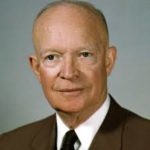Growing up as one of Jehovah’s Witnesses, I didn’t pay much attention to politics other than to think “those conversations” were something to avoid. Witnesses are publicly “apolitical,” meaning we didn’t get involved in politics at all, and at least to appearances, had no leaning left or right. Thinking back, I really have no idea how my father voted before he became a Witness (he was in his late 30’s by that time, so I’m quite certain he had voted). My grandparents politics were equally a mystery to me; they weren’t Witnesses and I’m pretty sure they would have felt that voting was a responsibility of any citizen. I don’t recall any conversations that would reveal a preference for either party, but I suspect they were probably Republicans. But if they were, they were a brand of Republican that you don’t see today. My Grandmother used to collect donations of books and school supplies and travel into the deep south to distribute them to impoverished (mostly black) communities and schools. She took very seriously her obligation as a Christian to “care for the needy and those less fortunate,” so this was a religious, rather than a political statement. But I’ve been reading some of Eisenhower’s speeches from the late 50’s and early 60’s, and some of his views then sound like things my grandparents (and probably my father as well) would have believed. A very different tone from the Republican party of today.
Anyhow, I was talking to a friend the other day who saw that I was reading Barry Goldwater’s book “The Conscience of a Conservative” and asked what I thought of it (he’s more libertarian than anything, but he leans Republican). I made the offhand comment that the Republican party of today would be unrecognizable to Goldwater and likely Reagan as well, and he said “Probably the same for the Democratic party too.” That kind of caught me off guard, because I had been thinking “Dang, I never knew Republicans used to think like that. They sound more like Democrats! I wonder where the Republican party lost its way.” Or something like that.
So I did a little digging and sure enough, both parties have gone through pretty significant philosophical changes over time. Republicans are very fond of reminding everyone that they are “the Party of Lincoln” and they freed the slaves. And while true, I’m not sure that it’s fair (or even appropriate) to attempt that connection, as ideologies have changed so dramatically over the years. If you go back to the origins of “liberalism” and “conservatism” in history you’ll find that either of them bear little actual resemblance to the terms as they are used today.
But I think that’s the nature of things. I know I’m not the same person I was 40 years ago, or for that matter even 10 years ago. I think anyone who says otherwise is either deluding themselves or completely lacking in introspection.
So now, the question is whether those inevitable changes have been a good thing or a bad thing. Or neutral. And while I know that’s extremely subjective, I think we can look at it from a more global perspective and arrive at a few conclusions.
Stay tuned.

 Jeff Flake, the junior Senator from Arizona, has stated that he will not be running for office at the next election. He has been an outspoken critic of Trump for some time, but my interest in him started when I heard him interviewed a year or so ago. Before I knew anything about his politics I was struck by his genuineness and humility during the interview. He has made it clear that his decision to leave the Senate is driven largely by his unwillingness to stay silent as Trump leads the Republican party with lying, divisiveness intimidation and bullying, He said that the Republican party of today would be unrecognizable to Dwight Eisenhower, Barry Goldwater and even Ronald Reagan. So I decided to do a little checking. I found an excerpt of one of Ike’s speeches and was pretty impressed. He said:
Jeff Flake, the junior Senator from Arizona, has stated that he will not be running for office at the next election. He has been an outspoken critic of Trump for some time, but my interest in him started when I heard him interviewed a year or so ago. Before I knew anything about his politics I was struck by his genuineness and humility during the interview. He has made it clear that his decision to leave the Senate is driven largely by his unwillingness to stay silent as Trump leads the Republican party with lying, divisiveness intimidation and bullying, He said that the Republican party of today would be unrecognizable to Dwight Eisenhower, Barry Goldwater and even Ronald Reagan. So I decided to do a little checking. I found an excerpt of one of Ike’s speeches and was pretty impressed. He said: It is two electric power plants, each serving a town of 60,000 population. It is two fine, fully equipped hospitals. It is some fifty miles of concrete pavement. We pay for a single fighter plane with a half million bushels of wheat. We pay for a single destroyer with new homes that could have housed more than 8,000 people.”
It is two electric power plants, each serving a town of 60,000 population. It is two fine, fully equipped hospitals. It is some fifty miles of concrete pavement. We pay for a single fighter plane with a half million bushels of wheat. We pay for a single destroyer with new homes that could have housed more than 8,000 people.” When I was a kid growing up as one of Jehovah’s Witnesses in Illinois farm country, every school morning started out with the Pledge, and music class generally had the National Anthem as part of it (we had a music teacher who apparently felt that would somehow instill patriotism and hopefully better behavior in us). As Witnesses, we of course didn’t salute the flag or sing the Anthem, and I still can feel the awkwardness and ostracism that inevitably came our way for that. But it was also very clear to me that the reason for our behavior was not out of disrespect for the flag, for the country, for the sacrifices made by members of the military or anything you can say the flag stands for; we simply viewed God’s laws as higher than the governments, and having dedicated our lives to God we could not also dedicate our lives to the United States, or perform what we interpreted as an act of worship to the government (the flag salute is actually interpreted to be a prayer). It may seem odd to equate saluting the flag or singing the National Anthem with dedicating one’s life, and I suppose it could be argued that wasn’t what those actions actually represented, but Witnesses believed that they did. (And for what it’s worth, how else would you interpret “I pledge allegiance”?)
When I was a kid growing up as one of Jehovah’s Witnesses in Illinois farm country, every school morning started out with the Pledge, and music class generally had the National Anthem as part of it (we had a music teacher who apparently felt that would somehow instill patriotism and hopefully better behavior in us). As Witnesses, we of course didn’t salute the flag or sing the Anthem, and I still can feel the awkwardness and ostracism that inevitably came our way for that. But it was also very clear to me that the reason for our behavior was not out of disrespect for the flag, for the country, for the sacrifices made by members of the military or anything you can say the flag stands for; we simply viewed God’s laws as higher than the governments, and having dedicated our lives to God we could not also dedicate our lives to the United States, or perform what we interpreted as an act of worship to the government (the flag salute is actually interpreted to be a prayer). It may seem odd to equate saluting the flag or singing the National Anthem with dedicating one’s life, and I suppose it could be argued that wasn’t what those actions actually represented, but Witnesses believed that they did. (And for what it’s worth, how else would you interpret “I pledge allegiance”?)
Republican Party today and yesterday
Let’s take a look at some of the views that conservatives like Goldwater and Buckley embraced. I deliberately exclude Ronald Reagan from this this discussion in spite of the fact that he’s the yardstick by which most conservatives measure themselves today; I leave him out because I’m not convinced he was a great thinker in the mold of Buckley, nor an ideologue like Goldwater. He was a spokesperson, and a very effective one at that, but I don’t think anyone would accuse him of a deep intellect.
While I don’t agree with everything either Buckley or Goldwater wrote (or said), there is much of the Republican Party of the fifties and sixties to be admired, and in contrast with some of what is seen today. For example, it seems that Republicans (or at least Trump and his ardent followers) have little problem with racism. When David Duke (head of the KKK) endorsed Trump, he pretended to know nothing about Duke and refused to disavow any endorsement. The whole “kneeling by football players is an act of disrespect to our beloved national anthem” has been a dogwhistle to racists. The players (virtually all of them African-Americans) made it clear that they were protesting police brutality directed disproportionately against African-Americans, and Trump turned it into an act of disrespect for the anthem, even going so far as to try to get them fired for this exercise in Constitutionally-protected First Amendment rights. And when neo-Nazis marched in Charlotte, one of them ultimately running down and killing a young woman, Trump’s response was “There are good people on both sides.” In contrast, when the ultra-right wing John Birch Society was cozying up to the Republican Party, Buckley explicitly and specifically disavowed them and made sure they would not gain a foothold and made it clear that racism was most definitely NOT a conservative ideology.
Ayn Rand is the intellectual godparent of many in the current Republican Party; I’ve read that Paul Ryan counts her as his major economic and political influence, and makes The Fountainhead and Atlas Shrugged required reading for his staff. And while it’s true that Barry Goldwater also found her writings influential, William Buckley did not. He found her strident, rigid and off-putting, and went so far as to write negative reviews of her books, and encourage others to write as well.
Eisenhower coined the term “military-industrial complex” and warned against the unchecked expansion of the military. I’ve cited in an earlier post a speech he made decrying the cost of an aircraft carrier or fighter jet when that money could be better spent building schools or inexpensive housing for the poor. The most recent news indicates that, to pay for the trillion-dollar tax break (which goes predominately to the wealthiest), Paul Ryan is advocating reducing Medicare and Social Security benefits, which the poorest so desperately need. Ike must be turning over in his grave.
And the list goes on. A recent meme I saw in Facebook compares the plank of the 1956 Republican Party in electing Eisenhower, and it reads more like a liberal’s dream. Here are the seven planks:
I did a bit of checking, and while there might be a bit of a misleading spin on a couple of the planks, in essence it’s pretty accurate. (Here’s an article evaluating the accuracy of the 7 points, and here’s a link to the actual platform for 1956).
Contrast that with the Republican Party today. Yeah, things change and change is often good. But the changes in the Republican Party from the late 50’s to today is not something to be proud of. It’s gone from an inclusive and supportive party of small government and fiscal responsibility to a mean-spirited and often bigoted party of the uber-rich where hatred of the federal government is so deep that Grover Norquist could say he wanted to “shrink government to the size that you could drown it in the bathtub.”